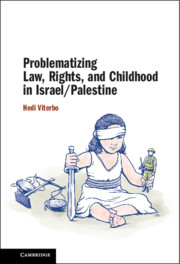Book contents
- Frontmatter
- Contents
- Acknowledgments
- Abbreviations
- 1 Conceptual and Theoretical Foundations
- 2 Casting the First Stone: The Israeli Legal System, Its Human Rights Critics, and Their Approaches to Young Palestinians
- 3 The Age of Governing: Young Age as a Means of Control
- 4 Boundary Governance: Amending Childhood and Separating Palestinians
- 5 Stolen Childhood: Voice, Loss, and Trauma in Human Rights Reports
- 6 Sights of Violence: Childhood in the Visual Battlefield
- 7 Infantilization and Militarism: Soldiers as Children, Children as Soldiers
- 8 Unsettling Children: Israeli Law and Settlers’ Childhood
- Index
5 - Stolen Childhood: Voice, Loss, and Trauma in Human Rights Reports
Published online by Cambridge University Press: 05 August 2021
- Frontmatter
- Contents
- Acknowledgments
- Abbreviations
- 1 Conceptual and Theoretical Foundations
- 2 Casting the First Stone: The Israeli Legal System, Its Human Rights Critics, and Their Approaches to Young Palestinians
- 3 The Age of Governing: Young Age as a Means of Control
- 4 Boundary Governance: Amending Childhood and Separating Palestinians
- 5 Stolen Childhood: Voice, Loss, and Trauma in Human Rights Reports
- 6 Sights of Violence: Childhood in the Visual Battlefield
- 7 Infantilization and Militarism: Soldiers as Children, Children as Soldiers
- 8 Unsettling Children: Israeli Law and Settlers’ Childhood
- Index
Summary
Chapter 5 tackles four interrelated interpretive frameworks recurring in human rights publications. It challenges their depiction of childhood, exposes their pitfalls and omissions, and links them to wider issues both globally and locally. First discussed is a mental health discourse of childhood trauma and loss. This language, it is argued, individualizes and often decontextualizes the issues at stake; pathologizes young Palestinians; and casts them as a security threat. Second, the depiction of Palestinian childhood as lost or stolen is criticized for overlooking Palestinians’ actual sociopolitical circumstances. Further, this chapter analyzes how the loss of childhood is often tied to the loss of the Palestinian homeland, and how this linkage portrays Palestinians’ collective past, present, and future. Third, the notion that Palestinians have a “right to childhood” is criticized for perpetuating two harmful tendencies of the dominant children’s rights discourse: the exclusion of young people (or their inclusion only on older people’s terms) and the legitimation of apathy and harshness toward those defined as adults. Finally, and contrary to what human rights organizations claim to be doing, this chapter highlights several ways in which they obscure rather than simply represent the voices of young Palestinians.
Keywords
- Type
- Chapter
- Information
- Problematizing Law, Rights, and Childhood in Israel/Palestine , pp. 178 - 220Publisher: Cambridge University PressPrint publication year: 2021

